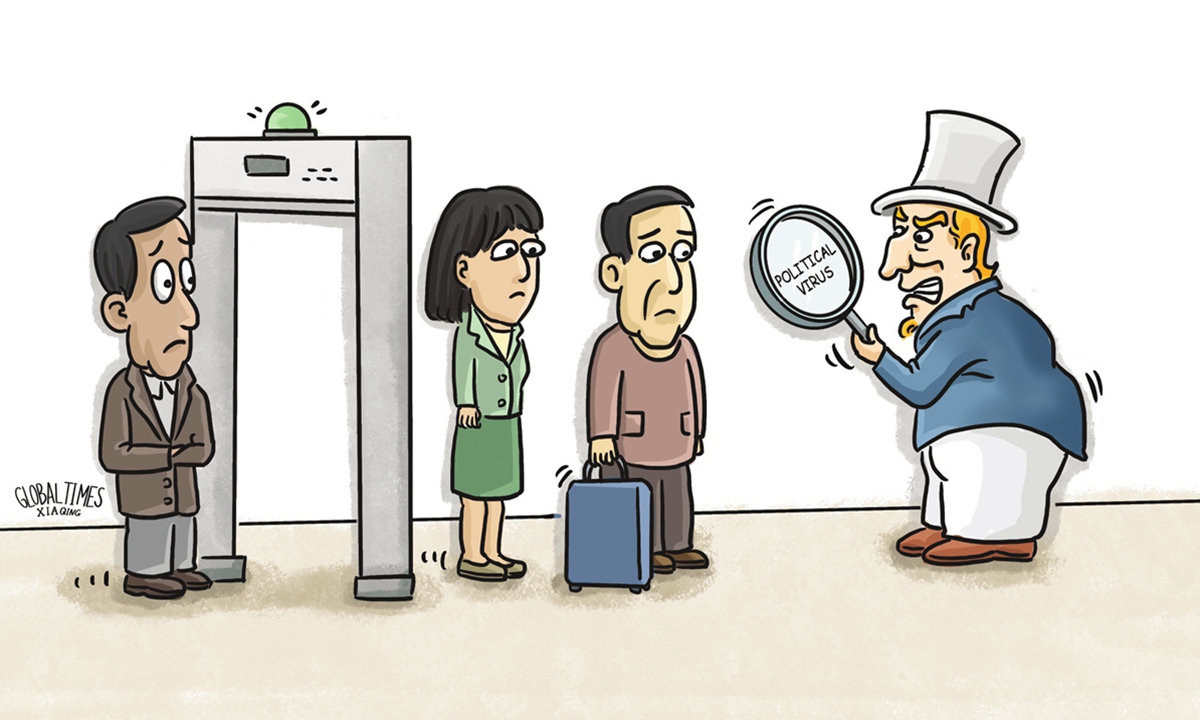
Illustration: Xia Qing/Global Times
The year 2022 ended on an encouraging note, when China announced its latest measures to optimize the country's COVID containment protocol and restore everyday life, a move taken in light of the hard-won outcomes after three years of a remarkable battle against the coronavirus. The comeback of the hustle and bustle across Chinese cities has been impressive. According to tourism authorities, over 52 million Chinese tourists traveled domestically during the three-day New Year holiday. Globally, traveling from and to China is also expected to take off soon, with air flights lined up for resumption.
These developments, however, did not resonate well in some parts of the world, where China skeptics are always readying themselves for the grand China-bashing game. The US administration moved swiftly to impose restrictions on those traveling from and via China. A spokesperson of the US State Department accused China of not sharing "adequate and transparent" data, in defense of the door-shutting on China. And when China responded to this provocative move, the White House's press secretary accused China of engaging in "retaliation", and claimed that there is "no cause" for that.
It would be most interesting if you go through these noise makers' "voting record" on China's COVID response. When China was among the few countries, if not the only one, that refused to give in to the virus and decided to engage in a fight, Western countries, who chose to co-exist with the deadly virus in exchange for a presentable economic report card, accused China of imposing "draconian" measures that undermined individual freedom and human rights. And now, it is the same bunch of people who criticize China's reopening as irresponsible, and spread disinformation with grossly exaggerated speculations of infections in China.
To add to the sarcasm, when countries like the US and Japan teamed up to forbid COVID-positive travelers from setting foot on their "untainted" soils, they never imposed any similar restrictions upon one another, where the latest XBB variant is ravaging. Such "friend-shoring" of epidemic control measures can only be justified on one epidemiological hypothesis: that a virus will voluntarily choose not to infect people of an ideological ally of its source country.
Experts and health authorities across the world have voiced concerns over such self-contradicting policies. Chris Murray, Seattle-based director of a health research center at the University of Washington, noted that travel restrictions over China "would not make sense". His view is echoed by Dominique Costagliola, a French epidemiologist, who believes such measures are "not very useful". Their only relevant point, if any, is to give "the impression that we are doing something", said Costagliola. The European Centre for Disease Prevention and Control (ECDC) and the International Air Transport Association (IATA) have also expressed their opposition against unnecessary requirements such as testing for travelers, which are believed to be "ineffective" and "unjustified".
Then why did governments of some Western countries decide to take prohibitive moves against China, a textbook practice of double standards, when scientists clearly suggest otherwise? The answer cannot be simpler: it's all about politics. In the "great" American cause to "outcompete" China, COVID has become a handy pretext for the ongoing smear campaign against the world's No.2 economy. As it goes out of the way to "align, invest and compete", the US is weaponizing everything it can find, COVID being a most convenient one, in an attempt to strangle the rise of what it sees as an ideological nemesis of the "Global West".
Let's take a step back and think this: should Western countries choose not to resign themselves to a premature coexistence with the virus, but instead to respond responsibly with a life-first attitude like the Chinese government, this pandemic would have not developed to where it is today. A zero-COVID world would no longer be a politically motivated narrative used by Western media to smear China, but a likely reality enabled by the collective global response to the virus.
China's three-year battle against COVID is nothing short of a miracle. Thanks to this responsible approach, China has managed to keep its people safe, while making outstanding contributions to the global fight against the pandemic. At this point, a shift of gear has been rendered justified and necessary in light of the evolution of the virus. This decision is also commended extensively across the world. The tourism authority of Thailand posted its warm welcome to Chinese tourists - "Three years, Amazing Thailand has been waiting for you for three years!" Such a message is echoed by a number of foreign cultural institutions and embassies on the Chinese social media site of Weibo.
When Western countries claim to follow the science, they are actually using COVID as a tool to contain their ideological opponents. It is unfortunate, however, that the politicization of viruses cannot make the world a virus-free one, and at the end of the day, it is the people, regardless of nationality, that will suffer. In this on-going fight against the pandemic, what the world needs is more solidarity, not less.
The author is a Beijing-based observer of international affairs.

